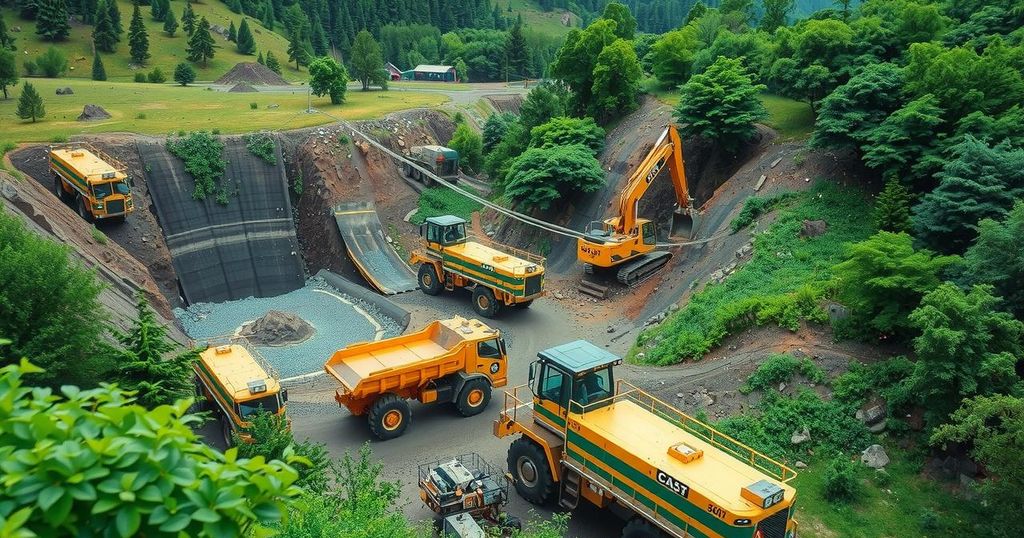Rare-Earth Production: U.S. and Brazil Seek Independence from China
The U.S. and Brazil are increasing rare-earth production to reduce reliance on China. China controls 70% of mining and 90% of processing, raising concerns. Aclara Resources plans to build a processing plant in the U.S. and has partnered with VAC for rare earths supply. Brazil’s reserves are significant, but mining costs and regulations are challenges. Aclara aims for more sustainable practices and plans a $600 million plant by 2028.
In a noteworthy shift, countries like the United States and Brazil are ramping up efforts to develop their own rare-earth production facilities, particularly in response to the significant global reliance on China. Approximately 70% of the world’s rare earth elements—a group of 17 metallic elements critical for technologies, from electric vehicles to smartphones—are mined in China. However, what creates concern is China’s staggering 90% share of the processing market for these elements, prompting an urgent need for alternative sources.
Ramón Barúa, the CEO of Aclara Resources in Canada, noted the competitive edge China maintains in this sector. Aclara is currently establishing a rare-earths mine with plans for a processing plant in the U.S. Expected to announce the location for this facility by August, Aclara has already secured a partnership with VAC, a German company building a magnet factory in South Carolina funded by the Pentagon.
The geopolitical landscape significantly influences interest in rare earths. Following the introduction of tariffs by the U.S. aimed at China, Chinese export restrictions on rare earth materials have stirred further concerns among U.S. tech manufacturers like Tesla. In addition, exports from certain companies resumed earlier this month, indicating a shift in the supply chain dynamics.
Brazil, with the world’s second-largest reserves of rare earths estimated at 21 million tons, could play a pivotal role in meeting global demand. This accounts for roughly a fifth of all known reserves, predominantly consisting of rare elements like dysprosium and terbium which are integral for high-performance magnets in electric vehicles. Despite its wealth of resources, Brazil has historically lagged behind due to complex mining regulations and challenges in attracting financing.
Costs surrounding the mining and processing of Brazilian rare earths are reportedly around three times higher than those found in China. Moreover, the limited number of companies outside of China familiar with rare-earth processing compounds the issue. Meanwhile, Brazil’s Minister of Mines and Energy, Alexandre Silveira, stated that the country is actively exploring potential deposits, which he regards as a significant opportunity.
Aclara’s new mine, located about 90 miles from Nova Roma, opened last year and is already in operation, supplying rare earths primarily to China. Nevertheless, significant investments have been made in the U.S. over the past five years to revitalize processing plants and factories that had previously succumbed to Chinese dominance. Following a national emergency declaration by former President Trump, rare earths processing has been prioritized in the U.S.
Across the Atlantic, Europe is also making strides to lessen its dependency on China. The European Union has set targets to process 40% of the critical raw materials it requires, aiming to cap imports from any one country at 65%. Aclara, after successfully launching a pilot plant in Brazil, plans to invest around $600 million to build a larger plant next to its mine, with production expected to ramp up by 2028.
The processing method Aclara plans to employ promises to be more environmentally sustainable compared to traditional practices predominantly seen in China. Concerns over environmental damages, particularly highlighted by tragic incidents such as the Vale dam collapse in 2019, have helped shape Brazil’s regulatory landscape into one that may align better with U.S. expectations. In contrast to conventional mining methods that often involve harmful chemical agents, Aclara is opting for a more manual excavation method, which significantly reduces the chances of environmental contamination.
Erik Eschen, the CEO of VAC, pointed out the advantages of Aclara’s operation, noting the surface-level positioning of their clays, which negates the necessity for deeper digging and improves efficiency. This focus on environmental responsibility represents a key differentiation for Aclara as it seeks to fill the growing demand for rare earths in non-China circuits.
Jon Hykawy, a recognized expert in the field, emphasized how contrasting Aclara’s environmentally conscious methods could play a vital role in its success in this complex market landscape. As companies and countries continue to pivot towards securing rare earths outside China, the ramifications may reshape the future of technology and sustainable energy solutions.
In summary, the emergence of rare-earths production facilities in the U.S. and Brazil marks a significant shift in the global supply chain, shrinking the West’s dependency on Chinese resources. With both countries taking proactive steps to secure their rare earths, the developments could reshape industries such as electric vehicles and consumer electronics. Aclara’s focus on environmentally friendly practices additionally positions it as a potential leader in the market as the need for sustainable solutions continues to grow. As geopolitical tensions evolve, the race for securing rare earths is more critical than ever.
Original Source: www.hindustantimes.com




Post Comment